tility economic development departments from 21 U.S. states and a
Canadian province replied to this year’s Utility Survey in order to
be considered for Site Selection’s sixth annual Top Utilities ranking.
Based on 2003 project results from their territories drawn from Conway
Data’s New Plant Database, the rankings examined four distinct criteria:
total capital investment, investment per capita, total new jobs created
and jobs per 10,000 residents. By adding up points of the top finishers
in each category, the editors of Site Selection arrived at the Top
10 and ties. 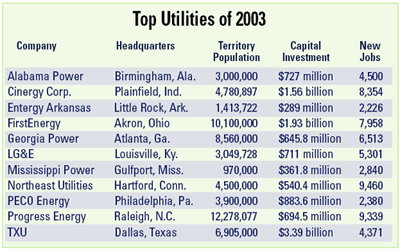
As it happens, three of these elite ED performers
— Alabama Power, Georgia Power and Mississippi Power — fall under
the corporate umbrella of perhaps the ultimate power player in the
United States: Atlanta-based Southern Company. But their ED departments
only answer to the operating company executives — demonstrating a
“business unit”-like operating independence that may explain better
than anything else their competitive edge. What’s more, in the corporate
parent’s succession plan, the new CEOs of these utilities bring with
them a high degree of economic development seasoning.
Are the Top Utilities category leaders bellwethers
of the times? Combined, the top 10 job attractors saw 61,080 new jobs
come to their territories in 2003. That’s a 10-percent decline from
the 67,823 new jobs created by the top 10 in 2002, consistent with
the touted jobless recovery that only began to add jobs in 2004. But
a look at the capital investment top performers shows that the Top
10 for 2003 welcomed $11.6 billion up 57 percent from $7.4 billion
in 2002.
Here’s a look at some of the programs that earned
that growth and earned their keep:
Alabama Power ![]()
www.alabamaeconomicdevelopment.com
Ever since the Alabama Power Economic and Community
Development department came into being 80 years ago as the “new industries”
division, it’s built up an arsenal of technical, planning and legislative
expertise that has helped land an equally impressive arsenal of top-flight
companies. In addition to attracting four of the world’s nine largest
automotive companies, the state is seeing continuing investment in
the aerospace and defense sectors, and Alabama Power is there to light
the candle.
Cinergy Corp. ![]()
www.indiana.cinergy.com
For evidence of Cinergy’s ED ties to its territory,
look no further than the directorship of the Indiana Dept. of Commerce’s
Region 7, part of the state’s new 12-region ED plan. That Indianapolis-area
position is being filled by loaned Cinergy ED professional Scott Fulford.
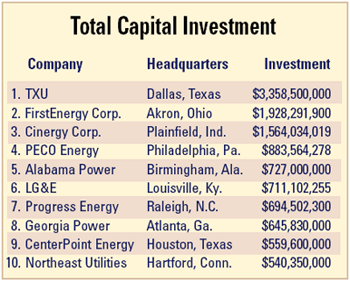
Cinergy is similarly embedded in the foundation
of the State of Indiana’s fledgling site and building database. And
it’s launched such efforts as a virtual building site program called
“Permits to Projects,” local training for economic development professionals
and the Cinergy Economic Development Network. The utility has simultaneously
published maps oriented toward foreign companies and toward the life
sciences sector, which has seen a rash of new projects recently. The
utility also serves all or portions of 10 Ohio counties and six Kentucky
counties, and helps lead ED efforts in the still-growing Cincinnati/Northern
Kentucky metro.
Entergy Arkansas ![]()
www.ConsiderArkansas.com
With major investments in the automotive,
food processing and oil and chemical sectors, Arkansas rode an upsurge
in investment in 2003, with a more-than-able assist from Entergy Arkansas.
Among the organization’s other successes during
the year was the accreditation by the International Economic Deve-lopment
Council of the University of Arkansas at Little Rock’s Mid-South Basic
Economic Development Course. In the field, a direct-mail industry
campaign had the direct effect of catching the attention of Eakas
Corp., which reversed an earlier assessment of the state and chose
to locate its second U.S. plant in the town of Wynne. Finally, Entergy
has provided guidance and project management skills to a 10-month
study of the Metro Little Rock region due to help target specific
industries when its results came available in summer 2004.
FirstEnergy Corp. ![]()
www.firstenergycorp.com/ed
Stretched across the states of Ohio, Pennsylvania
and New Jersey, the service territory of FirstEnergy Corp. is part
of the U.S. industrial backbone. And as such, its ED department is
deeply involved in promoting U.S. goods through its many-faceted Export
Now program.
In 2003, building on this long-term commitment,
the utility coordinated a trade mission that took seven customers
to three cities in Mexico. Not only were sales leads worth millions
of dollars established, but meetings were held with 18 large Mexican
companies with investment interest in the U.S. 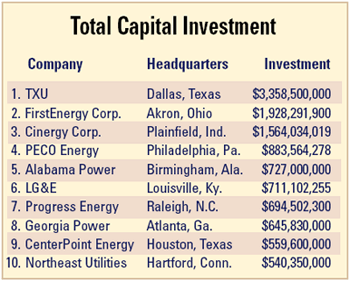
The company’s Synchronist business retention
software program was licensed to seven counties in 2003, helping them
assess their regional economies with the kind of attention to detail
that brings necessary attention to existing companies. FirstEnergy
in 2003 also developed a simulation program for measuring the impact
of a new investment on an area’s economy.
Among the latest partnerships to punctuate the
utility’s 40 years in Ohio is Team NEO, a coalition formed with six
Northeastern Ohio communities.
Georgia Power ![]()
www.georgiapower.com/grc
A founding member of the ED coalition Georgia
Allies, Georgia Power uses its Atlanta base to full advantage. Its
ED team also uses technology, whether in the field or on the Web.
One of its latest innovations is 360-degree views of “hot” industrial
buildings on the market. Building on that is a customized Web portal
for prospects, complete with FTP capabilities that allow for sharing
of CAD files, engineering drawings and other technical documents.
Another ongoing project, similar to the canvassing CoStar has launched
nationwide, is full-scale aerial documentation of all properties and
existing tenants at the state’s major office and industrial parks.
Georgia Power also produced two target industry
reports in 2003 on food processing and electronics, and conducted
a seminar on logistics for community ED professionals.
LG&E Energy ![]()
www.site-selection.com
Besides its catchy URL, the LG&E ED team gets
the word out about Kentucky’s business advantages via a direct-mail
campaign highlighting a different community each month, and high visibility
at a planned 16 major conferences in 2004. In 2003, the utility also
held three regional ED workshops.
“Competitive utility rates and reliable service
are key drivers of economic development,” said LG&E Energy President
and CEO Vic Staffieri in March 2003, when the company was honored
with the highest ranking for midsize business customer service by
J.D. Power and Associates. “I’m very proud that our employees are
doing their part to bring good jobs to the Commonwealth and keep them
here.”
Mississippi Power ![]()
www.mspower.com/ecodev
Through three operating divisions stretching
from Gulfport to Meridian, this Southern Co. operating company serves
a 23-county area in southeast Mississippi. Its ED professionals work
in concert with the Mississippi Development Authority and local organizations
to foster growth in the industrial base. 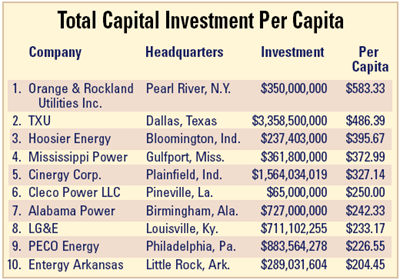
As of January 2004, the company had a new president
and CEO, Anthony J. Topazi. With 35 years at Southern Co., Topazi
brings company-wide and region-wide savvy to the utility, including
current ED affiliations with a host of regional and statewide groups.
Northeast Utilities ![]()
www.nu.com
NU recently funded a study touting its Connecticut
and Massachusetts territory as a location for medical device manufacturers.
But its territory extends into New Hampshire as well, where it helped
launch with the state a “Start-up New Hampshire” program to fund product
commercialization. NU’s ED reach covers all of New England, backed
by four electricity subsidiaries, one gas subsidiary, six competitive
energy companies and four realty subsidiaries.
NU’s new “Easy Circuits” program identifies circuits
where “available capacity and local zoning align to absorb accelerated
economic development,” writes Douglas G. Fisher, director of economic
and business development.
PECO Energy (Exelon) ![]()
www.peco.com/economic
PECO, like Entergy and the Southern Co. affiliates,
draws some benefit in its ED efforts from the heft of its parent company,
Exelon, which also owns Chicago-based ComED. At the bottom of the
ComED Web page touting Northern Illinois appears this live-link question:
“Interested in discovering Philadelphia, Pennsylvania?”
From all indications, many companies are indeed
interested, even in PECO’s own property. Wells Fargo Financial Acceptance
is moving 350 employees from its nearby airport base to the eye-catching
former PECO generating station in Chester, and making a $60-million
investment in the renovation.
Headlining its 2003 efforts, the utility teamed
with local leaders to launch the new Select Greater Philadelphia regional
ED program, encompassing 11 counties and three states. It’s all broadcast
through the coalition’s dynamic Web site, www.
selectgreaterphiladelphia.com, and through PECO’s top-notch “Communiqu?”
newsletter. 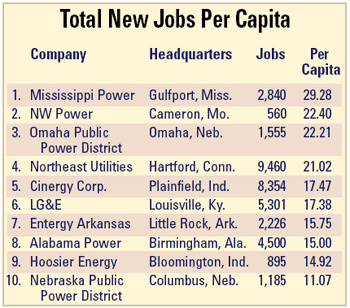
Progress Energy ![]()
www.progress-energy.com
A successful North Carolina ED rider program
allows qualified companies to receive a 50-percent electricity discount
when locating into existing buildings in the 47 N.C. counties Progress
serves. In 2003, the rider was expanded to the utility’s 13-county
South Carolina territory, with equally valuable results. The utility
also serves 32 counties in central and northern Florida, and its ED
team already helped shepherd 11 new projects in its service area in
the first quarter of 2004.
The utility is partnering with Atlanta-based
Earthlink on a “broadband over power lines” pilot program that it
hopes to use to extend high-speed Internet access to rural areas.
TXU Electric Delivery Co./TXU Gas Co.
![]()
www.locationtexas.com
Known as Oncor until its June 2004 renaming,
this Dallas-based utility serves 122 Texas counties and their 643
cities and towns across the middle part of the state, and has been
doing so for more than 40 years.

Certainly the $200-million location by Certainteed
in Sherman was a big deal in any year in TXU territory, but all deals
were dwarfed in 2003 by Texas Instruments’ announcement of a $3-billion
investment in the Dallas-Ft. Worth community of Richardson.
In February 2004, TXU Corp. named C. John Wilder,
former executive vice president and CFO at Entergy, as its new president
and CEO. The 20-year Royal Dutch/Shell Group veteran was named early
in 2004 by Institutional Investor as the best CFO in the electric
utilities industry.
As TXU Corp. restructures and sells non-core
units, TXU’s Electric Delivery segment is helping drive the parent
company’s operational earnings improvement at the same time it seeks
to help customers do the same. 